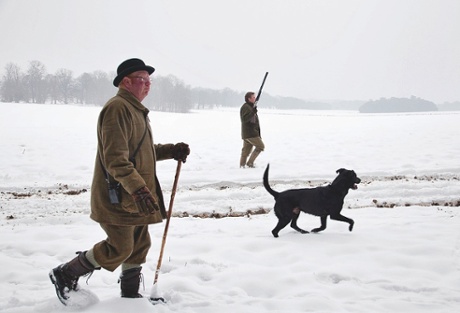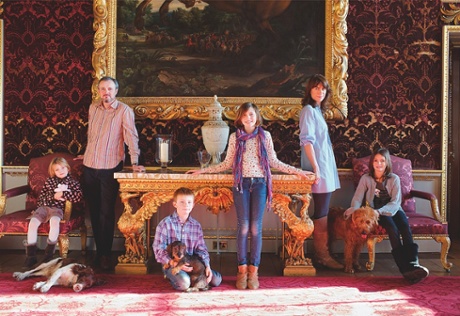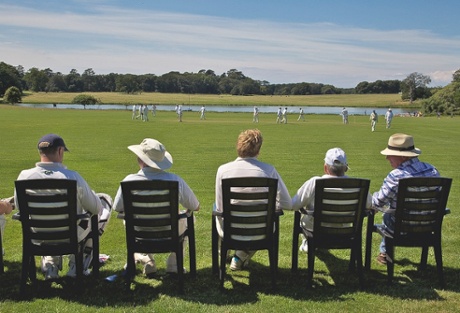Pass between the gatehouses, down the sweeping drive towards Holkham Hall, and you enter a time warp. Fallow deer cluster scenically under broad oaks, geese honk as they rise from the silver lake. It could almost be 1764, the year the grand house was completed, shortly after the death of Thomas Coke, the first Earl of Leicester.
The estate is now run by Viscount Thomas Coke, the son of the seventh Earl of Leicester. Photographs by Chris Steele-Perkins, who documented the 25,000-acre estate in Norfolk over the course of a year, appear to portray a deferential Downton Abbey-style existence, even today. But Steele-Perkins also discovered a world permeated by contemporary corporate values and defined by its visitors – a country home that, as he puts it, has been “reinvented in this new manner which is very consumable for the outside world”.
Holkham has diversified into 48 different businesses serving both aristocratic and popular tastes, from a boutique hotel to a caravan park and 300 houses, mostly let to local people. There are 200 full-time and 150 seasonal staff – including six gamekeepers and a butler, but also a conservation manager and education officer, too. Holkham’s walled estate is open to the public, hosting concerts and festivals. Each year, more than half a million people visit Holkham’s beach, which is a national nature reserve and, unusually, is entrusted to the privately owned estate rather than the government’s wildlife body Natural England.

The Cokes (pronounced “Cook”) are more generous over public access than most great estates, but they are wary of the media. David Horton-Fawkes, estates director, admits they were nervous about giving access to Steele-Perkins, a member of the Magnum collective who has documented poverty around Britain. “We can easily be depicted as an anachronistic relic of the 19th century, but we’re not that,” Horton-Fawkes insists. “We don’t want to be seen as forelock-tugging servants living in the 19th century. It’s disrespectful to the people who work here.”
In fact, Steele-Perkins found a bustling, busy estate which he likens to “a well-run ship”. “I started to think of the estate in nautical terms,” he notes in an introduction to his book of these photographs. “A long time ago I had spent a week on the aircraft carrier HMS Invincible where the crew was organised into myriad teams, but worked together as an organic whole when needed. Holkham is similar: building maintenance, farming, forestry, gamekeeping, with their officers and their petty officers and their ratings, in effect.”
For much of the 20th century, country piles such as Holkham were an endangered species. Prohibitive death duties between the wars caused the break-up of many great estates, which were sold for development, handed over to the National Trust or, incredibly, demolished. Holkham held 42,000 acres in the late 1940s when the fourth earl, another Thomas Coke, tried to pass it to the National Trust. That deal never happened and the Cokes were down to their last 25,000 acres in 1973 when Edward, father of the current incumbent, began running the estate. “When he took over in 1973, every facet was losing money,” says Viscount Coke, 49, who lives in part of the hall with his wife Polly and their four children.

When Coke returned to his family seat aged 28, after Eton, university and the army, he remembers his father looking at him and saying, “What are you doing here?” The seventh earl (who is still alive) managed a mix of farming, forestry and shooting, with a few tourists visiting the house, and he didn’t need any help. So the young heir began by looking after a large caravan park – “We’d prefer to say holiday park,” Coke says, “we’ve invested a lot on landscaping and making it nice” – which had returned to the estate after the local council’s lease ended.
Twenty years ago, 75% of Holkham’s turnover came from the land. Now, tourism and leisure make up 55% of turnover; farming and property rentals are only 40%. Coke was given full control of the estate seven years ago and appointed Horton-Fawkes two years ago. “For a landowner, I’m not bad at this customer service sort of thing, but David introduced me to a whole new level,” Coke says. “I don’t think I’ve uttered the word ‘punter’ for the last few years – I have to say things like ‘guest’.” Such openness has been rewarded: Coke is surprised that his walled garden is now tended by 23 volunteers. “I always thought people would happily volunteer for the National Trust, but to volunteer for Little Lord Fauntleroy living in a big house – it’s amazing we’ve got to that position.”
In many ways, the estate resembles any other modern corporation. Coke has introduced board meetings and non-executive directors, “people with experience from outside”. Senior staff recently visited Volvo’s HQ in Gothenburg to see how they did business, and they already have some unusual incentives in place: if an employee doesn’t perform a task on time, they must bake a cake. Coke is not exempt although, he admits, when called upon he “made two loaves of bread in the breadmaker”.

Coke and his wife have a private staff of three, compared with 50 in the Downton era, though this does include a butler. When Coke took over the estate, he says, “I thought, ‘Dad had a butler, I’m not going to have one’ – but it’s such a big house.” The butler, Steele-Perkins notes, is “quite young and nothing like the butler of fiction”. He wears full butler attire only for formal occasions, and Steele-Perkins spent time with the staff while they prepared for one such event: a black-tie dinner for 24 people. “Laying the table, lining up the glasses, took hours.”
Steele-Perkins was surprised to find that even among themselves, staff refer to their bosses as “Lord” and “Lady”. Horton-Fawkes says that Tom and Polly “lost a lot of sleep” over this. “They are very approachable, and didn’t want that deferential relationship,” he says. Nevertheless, they decided to retain a traditional formality to “reinforce the boundary between work and home”.
As for the staff, it seems that old habits die hard. “I quite like saying ‘Lord Coke’, that formality seems right for the estate,” says Sarah Henderson, Holkham’s conservation manager. Kevan McCaig, the head gamekeeper, who was previously employed by the royal family at Sandringham, says he is “more comfortable” calling his boss Lord Coke. “In different places I’ve worked I’ve never called anybody by their first name,” he says.
McCaig lives in a cottage in the grounds. Only one member of staff lives in the hall itself: the head of security. But while he was working there, Steele-Perkins was able to stay in the house. “It could be quite spooky,” he says, “coming back there at night, torch in hand, after dining at one of the pubs that Holkham owns, footsteps echoing down stone paved corridors above the haunted cellars, a whisper of wind around the windows…” Over the course of the year, as the family got to know him better, he graduated from the butler’s quarters to the guest bedrooms. He remembers one night staying in a bedroom with Italian Renaissance paintings on the wall – a room which, he recalls, “had a footprint bigger than that of my whole house in London”
• Chris Steele-Perkins’ book A Place In The Country, from which these photographs are taken, is published by Dewi Lewis next month, priced £25.
guardian.co.uk © Guardian News & Media Limited 2010
Published via the Guardian News Feed plugin for WordPress.
 This article titled “Holkham Hall: a modern-day Downton” was written by Words: Photographs:, for The Guardian on Friday 17th October 2014 15.32 UTC
This article titled “Holkham Hall: a modern-day Downton” was written by Words: Photographs:, for The Guardian on Friday 17th October 2014 15.32 UTC